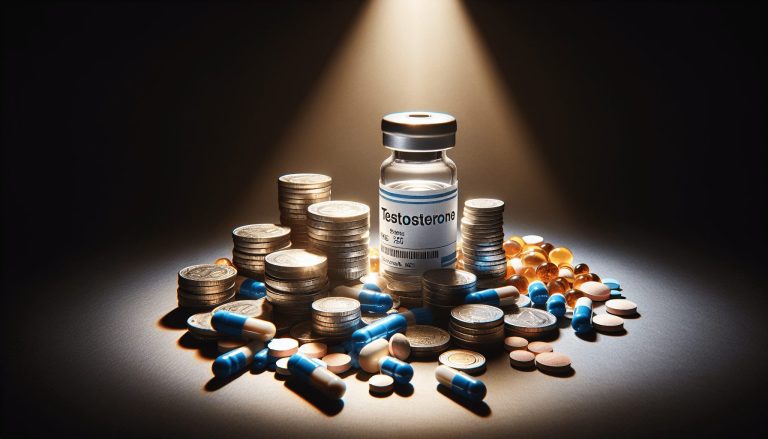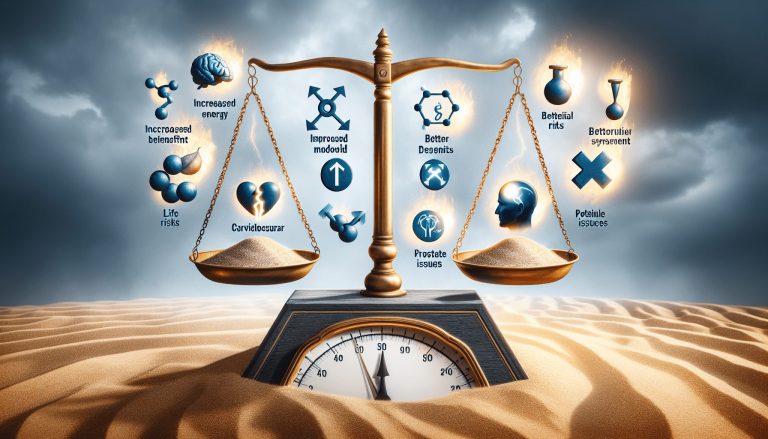How Long Can You Stay On Testosterone Replacement Therapy?
Imagine embarking on a journey towards better health and vitality. testosterone replacement therapy (TRT) offers support to those experiencing low levels of testosterone. But how long can this therapy be sustained? It’s a question many individuals ask as they consider the benefits and potential risks of TRT. In this article, we will explore the duration of testosterone replacement therapy, shedding light on what factors affect its length and what precautions should be taken to ensure its effectiveness. So, let’s dive into the world of TRT and discover how it can provide long-lasting benefits for your overall well-being.
Factors to Consider
Age
Age is an important factor to consider when determining the duration of testosterone replacement therapy (TRT). Younger individuals may require TRT for a shorter period of time, as their bodies are generally better able to produce and maintain healthy hormone levels. On the other hand, older individuals may need longer-term treatment to address age-related declines in testosterone production.
Overall health
The overall health of an individual plays a significant role in determining how long they can stay on TRT. Those who are in good health and have minimal underlying health conditions may be able to undergo TRT for an extended duration. However, individuals with pre-existing health issues may require more cautious monitoring and potentially shorter durations of therapy.
Underlying conditions
Certain underlying conditions, such as hypogonadism or chronic illnesses, may necessitate long-term use of TRT. In these cases, the duration of therapy will be determined by the specific condition and the individual’s response to treatment. It is crucial to work closely with a healthcare professional to determine the appropriate duration of TRT for these conditions.
Lifestyle choices
Lifestyle choices can influence the duration of TRT. Engaging in a healthy lifestyle that includes a balanced diet and regular exercise can contribute to optimal hormone balance and potentially reduce the need for long-term TRT. Conversely, factors such as smoking and excessive alcohol consumption may impact hormone levels and require more careful monitoring and adjustment of therapy duration.
Goals of therapy
The goals of TRT can vary from individual to individual. Some may seek short-term treatment to address specific symptoms or concerns, while others may require long-term therapy to maintain healthy hormone balance. It is essential to communicate your goals to your healthcare provider, as they can guide you in determining the appropriate duration of TRT based on your specific needs and desired outcomes.
Safety Considerations
Medical supervision
It is crucial to undergo TRT under the supervision of a qualified healthcare professional. Regular check-ups and monitoring of hormone levels are essential to ensure safety and effectiveness of the therapy. Your healthcare provider will be able to guide you in determining the appropriate duration of TRT based on your individual response and any potential side effects.
Monitoring hormone levels
Regular monitoring of hormone levels, such as testosterone and estrogen, is important when undergoing TRT. This allows healthcare providers to assess the effectiveness of the therapy and make necessary adjustments if hormone imbalances or potential side effects occur. Monitoring hormone levels can help determine if long-term use of TRT is still necessary or if adjustments need to be made.
Regular check-ups
Maintaining regular check-ups with your healthcare provider throughout the course of TRT is crucial for ongoing monitoring and evaluation. These visits allow your healthcare provider to assess your overall health, monitor the effectiveness of the therapy, and address any concerns or side effects that may arise. Regular check-ups help ensure the therapy remains safe and appropriate for your needs.
Managing side effects
One important aspect of managing TRT is addressing and managing any potential side effects that may arise. Common side effects of TRT can include acne, fluid retention, and changes in mood or libido. By working closely with your healthcare provider, you can address these side effects and determine if any adjustments to the duration of TRT are necessary.

Long-Term Use of Testosterone
Potential risks and benefits
Long-term use of testosterone replacement therapy can offer numerous benefits, including increased energy, improved muscle mass, and enhanced libido. However, it is important to consider the potential risks associated with long-term use as well. These risks can include prostate enlargement, cardiovascular issues, and potential dependence on the therapy. Working with a healthcare professional can help assess the potential risks and benefits for extended TRT use.
Effectiveness over time
The effectiveness of TRT can vary over time. Initially, many individuals experience a significant improvement in symptoms and overall well-being. However, over a long-term duration, the response to TRT may diminish. This is why regular monitoring of hormone levels and ongoing evaluation with a healthcare professional is essential to ensure the therapy remains effective and appropriate for your needs.
Maintaining hormone balance
One key consideration for long-term use of TRT is maintaining hormone balance. Hormone levels can fluctuate and change over time, and adjustments to the therapy may be needed to address these changes. Your healthcare provider can guide you in determining the appropriate duration for maintaining hormone balance and adjusting the therapy as necessary.
Duration by Age
Duration for younger individuals
Younger individuals may require TRT for a shorter duration due to their bodies’ ability to produce and maintain healthy hormone levels. If the need for TRT arises from an underlying condition, such as hypogonadism, the duration of therapy will depend on the individual’s response to treatment and ongoing monitoring of hormone levels. In general, younger individuals may benefit from shorter durations of TRT.
Duration for older individuals
Older individuals may require longer-term use of TRT to address age-related declines in testosterone production. As the body naturally decreases its hormone production with age, TRT can help maintain hormone balance and alleviate symptoms of low testosterone. The duration of therapy for older individuals will depend on their overall health, response to treatment, and ongoing monitoring of hormone levels.
Adjustments with age
It is important to note that the duration of TRT may need to be adjusted as individuals age. Hormone production and needs can change over time, and adjustments to the therapy may be necessary to maintain optimal hormone balance and address any age-related changes. Regular evaluation and communication with a healthcare professional are crucial in determining the appropriate duration of TRT as individuals age.

Duration for Specific Conditions
Hypogonadism
Individuals with hypogonadism, a condition characterized by low testosterone levels, may require long-term use of TRT. The duration of therapy will depend on the individual’s response to treatment and ongoing monitoring of hormone levels. Working with a healthcare provider is essential to ensure that TRT effectively addresses the symptoms of hypogonadism and that the therapy duration is appropriate for the individual’s needs.
Chronic illnesses
For individuals with chronic illnesses, the duration of TRT will depend on the specific condition and overall health of the individual. Some chronic illnesses, such as diabetes or HIV, can contribute to hormone imbalances and may necessitate long-term use of TRT. Regular monitoring of hormone levels and ongoing evaluation with a healthcare professional are crucial in determining the appropriate duration of TRT for individuals with chronic illnesses.
Andropause
Andropause, often referred to as “male menopause,” is a natural age-related decline in testosterone levels. TRT can be used to address the symptoms of andropause, such as fatigue, reduced libido, and mood changes. The duration of TRT for andropause will depend on the individual’s response to treatment and ongoing monitoring of hormone levels. Regular check-ups with a healthcare professional are essential to ensure that TRT remains effective and appropriate.
Lifestyle Choices
Diet and exercise
Maintaining a healthy diet and engaging in regular exercise can positively impact hormone balance and potentially reduce the need for long-term TRT. A diet rich in nutritious foods, such as fruits, vegetables, lean proteins, and whole grains, can support hormone production and overall health. Regular exercise, including both cardiovascular and strength training activities, can help optimize hormone levels and well-being. By making these lifestyle choices, individuals may be able to reduce their dependency on TRT and potentially shorten the duration of therapy.
Smoking and alcohol consumption
Smoking and excessive alcohol consumption can negatively impact hormone levels and overall health. Smoking has been linked to lower testosterone levels, while excessive alcohol consumption can interfere with hormone production and metabolism. It is important to minimize or eliminate these habits to support hormone balance and overall well-being. By making positive changes to these lifestyle choices, individuals may be able to optimize hormone levels and potentially reduce the need for long-term TRT.
Stress management
Managing stress is essential for hormone balance and overall health. Chronic stress can contribute to hormone imbalances and may necessitate long-term use of TRT. Engaging in stress-reducing activities, such as meditation, yoga, or hobbies, can support hormone balance and potentially reduce the need for long-term TRT. It is important to prioritize self-care and establish healthy coping mechanisms to manage stress effectively.
Managing Expectations
Realistic goals
Setting realistic goals is important when undergoing TRT. It is crucial to understand that TRT may not completely reverse all symptoms or conditions associated with low testosterone. By setting realistic expectations, individuals can better evaluate the effectiveness of the therapy and determine the appropriate duration. Your healthcare provider can help guide you in setting realistic goals and determining the duration of TRT based on your specific needs and desired outcomes.
Understanding limitations
It is important to understand the limitations of TRT. While it can provide numerous benefits, it may not be the sole solution for all health concerns or conditions. Working with a healthcare professional and understanding the potential risks and benefits of TRT can help individuals make informed decisions about therapy duration and explore alternative therapies, if necessary. By understanding the limitations of TRT, individuals can better manage their expectations and make decisions that align with their overall health goals.
Customized treatment plans
Every individual is unique, and their hormone needs and response to therapy may vary. A healthcare provider will create a customized treatment plan that takes into account the individual’s specific needs, goals, and overall health. This includes determining the appropriate duration of TRT based on the individual’s response to treatment, ongoing monitoring of hormone levels, and evaluation of any potential side effects or changes in health. By following a customized treatment plan, individuals can ensure that their TRT is tailored to their specific needs and remains both safe and effective.
Alternative Therapies
Managing testosterone naturally
Some individuals may be interested in managing testosterone levels naturally and reducing their dependency on TRT. This can be achieved through lifestyle modifications, such as maintaining a healthy diet, regular exercise, and stress management. Natural supplements, such as zinc and vitamin D, may also support hormone production. However, it is essential to consult with a healthcare professional before making any changes to an existing TRT regimen or exploring alternative therapies.
Reducing dependency on TRT
For individuals who have been on long-term TRT, reducing dependency on the therapy may be a consideration. This can be done gradually under the guidance of a healthcare professional, who will monitor hormone levels and evaluate the individual’s response. It is important to approach the reduction of TRT with caution and work closely with a healthcare provider to ensure a safe and appropriate transition.
Consulting Healthcare Professionals
Importance of medical advice
When considering or undergoing TRT, it is crucial to seek medical advice from a qualified healthcare professional. They will assess your individual needs, evaluate your overall health, and determine the appropriate duration of TRT based on a variety of factors. Healthcare professionals have the knowledge and expertise to guide you through the process, monitor your hormone levels, provide ongoing evaluation, and address any concerns or side effects that may arise.
Seeking expert opinion
Seeking expert opinion is key when it comes to determining the appropriate duration of TRT. Consulting with an endocrinologist, urologist, or other specialists who specialize in hormone therapy can provide valuable insights and guidance. These experts are well-versed in the complexities of TRT and can help you make informed decisions about therapy duration based on your unique needs and circumstances.
Conclusion
Determining the appropriate duration of testosterone replacement therapy involves careful consideration of various factors, including age, overall health, underlying conditions, lifestyle choices, and therapy goals. Factors such as medical supervision, monitoring hormone levels, regular check-ups, and managing side effects are important for maintaining safety and effectiveness during TRT. The duration of TRT can vary for younger and older individuals, as well as for specific conditions such as hypogonadism, chronic illnesses, and andropause. Lifestyle choices, such as a healthy diet, regular exercise, stress management, and reducing dependency on TRT, can also influence the duration of therapy. Managing expectations, understanding limitations, and following customized treatment plans are crucial for a successful TRT experience. Consulting healthcare professionals and seeking expert opinion are essential for personalized guidance and ensuring optimal outcomes. Ultimately, by considering these factors and working closely with healthcare professionals, individuals can find the appropriate duration and approach to testosterone replacement therapy that best suits their needs and goals.







